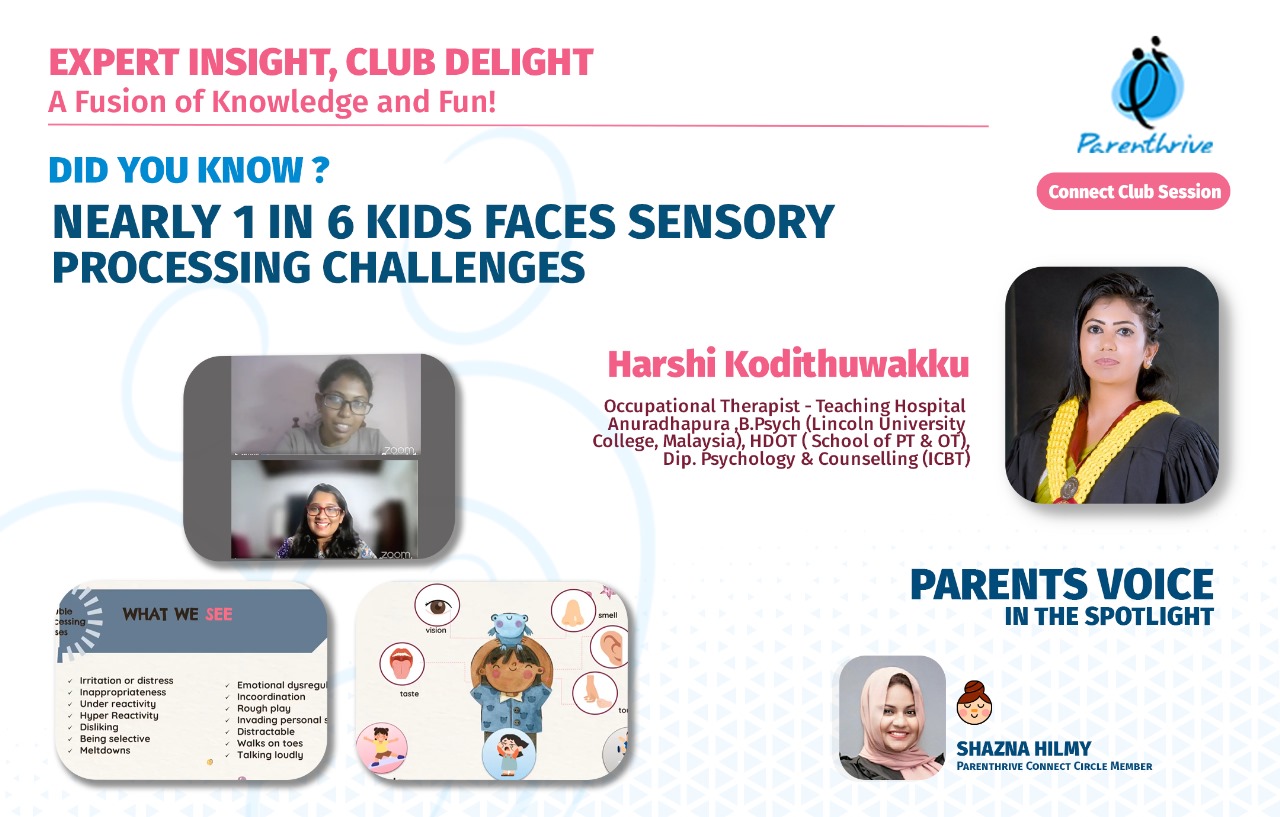
Sensory processing challenges are a reality for many children, often affecting their comfort, behavior, and ability to thrive in everyday environments. To empower parents with practical solutions, Parenthrive hosted an enlightening online session on November 13, 2024, featuring Harshi Kodithuwakku, an occupational therapist from the Teaching Hospital Anuradhapura.
This session explored the complexities of sensory processing challenges and offered actionable strategies to create supportive home environments tailored to children's unique sensory needs.
Understanding Sensory Processing Challenges
The session began with an in-depth explanation of the sensory system, covering the key senses—vision, smell, hearing, touch, vestibular (balance), interception (internal sensations), and proprioception (body position). Participants learned how sensory input is processed and how disruptions in this process could lead to challenges such as sensory avoidance or sensory seeking.
Harshi explained that while sensory processing issues can impact children with or without disabilities, the prevalence ranges from 10%-55% among children without disabilities and 40%-88% among children with disabilities.
What Happens Inside the Brain?
Children with sensory processing challenges may exhibit two main patterns:
- Over-responsiveness (Sensory Avoiding): These children may be overwhelmed by sensory input, leading to reactions like meltdowns or withdrawal.
- Under-responsiveness (Sensory Seeking): These children may actively seek out sensory stimulation, sometimes engaging in behaviors like rough play or talking loudly.
Signs of Sensory Processing Challenges
Parents were guided through a range of behaviors that may indicate difficulty in processing sensory input, including:
- Emotional dysregulation and meltdowns
- Clumsiness and coordination issues
- Overreacting or underreacting to stimuli like touch, noise, or smells
- Difficulty in social interactions, school performance, and daily routines
Harshi also highlighted how sensory challenges evolve as children grow. For example:
- Babies may have issues with cuddling, feeding, or calming down.
- Toddlers may resist transitions, struggle with self-care, or be unusually active.
- Preschoolers may overreact to stimuli, have motor skill delays, or display withdrawn or aggressive behavior.
- School-age children may face difficulties in learning, making friends, or adapting to classroom routines.
Creating a Sensory-Friendly Home
A significant portion of the session focused on building a "smart home" setup that helps children regulate their sensory input. Key suggestions included:
- Calm corners or safe spaces for retreating during overstimulation.
- Tactile zones with sensory-rich materials like soft fabrics or textured items.
- Movement areas for activities like jumping or stretching.
- Visual stimulation controls to avoid overwhelming environments.
- Sound management tools to minimize noise-related discomfort.
Practical Tips for Parents
Harshi shared actionable strategies for daily life, such as:
- Establishing routines to build predictability.
- Using visual schedules to simplify tasks.
- Breaking tasks into manageable steps and being consistent with boundaries and consequences.
- Showing unconditional love and experimenting with strategies until finding what works best.
When to Seek Medical Attention
Parents were encouraged to consult professionals if sensory challenges:
- Interrupt everyday life
- Take a dramatic turn in severity
- Become too difficult to manage
- Hinder learning or social interactions
The session emphasized the importance of recognizing that sensory processing challenges are real, often misunderstood, but manageable with the right interventions and support.
FAQs Addressed
The interactive Q&A section tackled common concerns, such as:
- Are sensory processing challenges hereditary?
- Is this a medical condition?
- Why do these challenges impact self-regulation?
- Do sensory issues disappear with age?
- Whom should parents consult for treatment?
Empowering Parents to Take Action
The session concluded with a reminder that while sensory processing challenges can be overwhelming, they are manageable with proper understanding, empathy, and intervention. Parents were encouraged to build supportive environments and seek professional help when needed.
By addressing this vital topic, Parenthrive continues to equip parents with knowledge and tools to help their children thrive. If you missed the session, stay tuned for more events aimed at empowering parents with expert guidance on key aspects of child development.






